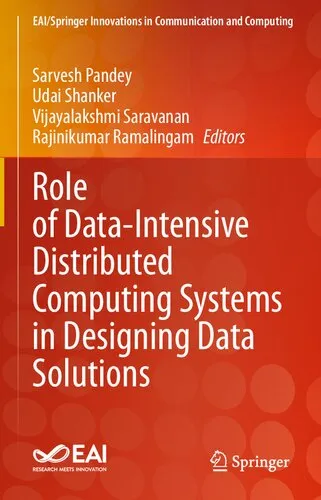Principles of Distributed Systems: 9th International Conference, OPODIS 2005, Pisa, Italy, December 12-14, 2005, Revised Selected Papers
4.0
Reviews from our users

You Can Ask your questions from this book's AI after Login
Each download or ask from book AI costs 2 points. To earn more free points, please visit the Points Guide Page and complete some valuable actions.Related Refrences:
Introduction to "Principles of Distributed Systems"
"Principles of Distributed Systems: 9th International Conference, OPODIS 2005, Pisa, Italy, December 12-14, 2005, Revised Selected Papers" is a seminal collection of scholarly papers that represent cutting-edge research and advancements in the field of distributed systems. Edited by James H. Anderson, Giuseppe Prencipe, and Roger Wattenhofer, this volume encapsulates the intellectual contributions of prominent researchers who presented their groundbreaking work at the esteemed OPODIS 2005 conference.
Distributed systems are a cornerstone of modern computing, offering solutions to complex problems by enabling decentralized computation and resource sharing. The OPODIS 2005 conference served as a vibrant forum for discussing imperative subjects such as distributed algorithms, fault tolerance, communication protocols, synchronization, and scalability. Through this book, the key ideas and findings shared during this conference have been meticulously revised and compiled, making it an invaluable resource for researchers, practitioners, and students in distributed computing.
As distributed systems continue to evolve and impact various technological domains, such as cloud computing, Internet of Things (IoT), and peer-to-peer systems, this collection of papers provides the foundational principles and innovative techniques that underpin these systems. With a focus on both theoretical concepts and practical applications, the book addresses challenges and solutions that remain highly relevant today.
Detailed Summary of the Book
The book comprises revised, peer-reviewed papers that reflect the diversity and depth of topics discussed at OPODIS 2005. Spanning across multiple dimensions of distributed computing, the chapters delve into advanced algorithms, system architectures, and analytic models that are fundamental to understanding and designing robust distributed systems.
Key themes explored in the book include:
- Novel distributed algorithms for efficient data dissemination and communication.
- Techniques for achieving fault-tolerant systems in adverse operating environments.
- Synchronization and coordination mechanisms in decentralized networks.
- Consensus problems and their solutions in asynchronous networks.
- Analyses of system performance and scalability of distributed solutions.
Each paper is accompanied by rigorous proofs, simulations, and experimental results that validate the proposed approaches. By presenting innovative methodologies alongside comprehensive theoretical insights, the book offers a balanced perspective for readers seeking to deepen their knowledge of distributed systems.
Key Takeaways
Readers of this book will gain:
- A strong foundation in the principles of distributed computing, including algorithms, protocols, and models.
- Insights into contemporary challenges facing distributed systems and how researchers are addressing them.
- An appreciation of the interdisciplinary nature of distributed systems, which intersect with networking, data structures, and operating systems.
- Knowledge of real-world applications and how theoretical concepts translate into practical solutions.
- A deeper understanding of the collaborative and dynamic nature of distributed research communities.
Whether you are an academic pursuing research in distributed systems or a software engineer building scalable systems, the insights from this book will undoubtedly enrich your understanding and problem-solving skills.
Famous Quotes from the Book
The breadth of ideas in the book is reflected in its many profound insights. Here are a few quotes that capture its essence:
“Distributed systems are the art of making a collection of independent computers appear as a unified system.”
“Fault tolerance is not a luxury in distributed computing—it is the foundation of reliability.”
“Consensus is hard to achieve, not because of algorithms, but because of the unpredictable nature of distributed environments.”
Why This Book Matters
The significance of this book lies in its ability to bridge the gap between fundamental theories and practical applications of distributed systems. By consolidating landmark contributions from OPODIS 2005 and presenting them in a refined format, the book provides a roadmap for academics, students, and engineers to navigate the challenges and opportunities in distributed computing.
Distributed systems power some of the most critical infrastructures in the modern world, from global financial systems to large-scale online platforms. Understanding their principles is essential for building reliable, efficient, and scalable systems that can withstand the complexities of real-world operations.
This book remains a timeless resource for anyone passionate about distributed computing, equipping readers with the knowledge and tools to contribute to this exciting and ever-evolving field.
Free Direct Download
You Can Download this book after Login
Accessing books through legal platforms and public libraries not only supports the rights of authors and publishers but also contributes to the sustainability of reading culture. Before downloading, please take a moment to consider these options.
Find this book on other platforms:
WorldCat helps you find books in libraries worldwide.
See ratings, reviews, and discussions on Goodreads.
Find and buy rare or used books on AbeBooks.
1157
بازدید4.0
امتیاز50
نظر98%
رضایتReviews:
4.0
Based on 0 users review
"کیفیت چاپ عالی بود، خیلی راضیام"
Questions & Answers
Ask questions about this book or help others by answering
No questions yet. Be the first to ask!



